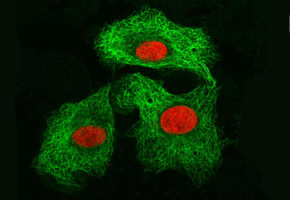

The São Paulo Advanced School of Comparative Oncology will present the most recent scientific advances in the area, which integrates naturally occurring cancer in domestic animals and humans
The São Paulo Advanced School of Comparative Oncology will present the most recent scientific advances in the area, which integrates naturally occurring cancer in domestic animals and humans.
The São Paulo Advanced School of Comparative Oncology will present the most recent scientific advances in the area, which integrates naturally occurring cancer in domestic animals and humans.

The São Paulo Advanced School of Comparative Oncology will present the most recent scientific advances in the area, which integrates naturally occurring cancer in domestic animals and humans
By Elton Alisson
Agência FAPESP – In October, the most renowned specialists in comparative oncology from Brazil and abroad will come together in São Paulo to discuss the most recent scientific advances in the area, which integrates naturally occurring cancer in animals and humans. These specialists will participate in the São Paulo Advanced School of Comparative Oncology to be held from September 30 to October 7 at the Grande Hotel São Pedro in Águas de São Pedro, São Paulo State.
Geared toward doctoral and post-doctoral students and young researchers in the areas of human and veterinary oncology, one of the event’s objectives is to stimulate advances in the knowledge on comparative oncology in Brazil. The event is held under the auspices of the FAPESP program of the São Paulo School of Advanced Sciences.
The concept has been touted as an alternative to the research and development of new cancer therapies. This is because spontaneous tumors, often found in domestic animals, are similar to those that occur in humans, such as breast carcinomas, lymphomas, osteosarcomas, skin cancer and brain tumors.
Furthermore, according to researchers in the field, the spontaneous tumors found in domestic dogs and cats present similar elements to the neoplasias of humans, such as similarity in the prevalence rates in specific geographic regions, dietary factors, neuro-hormonal impacts, and environmental factors (pollution), as well as similar genetic and epigenetic mechanisms. For this reason, companion animals are considered excellent models for the detection of environmental risk factors and can be used for the development and optimization of new imaging systems to study tumors and new therapeutic strategies for a variety of cancers.
“The population of companion animals with spontaneous neoplasia allows for comparative studies with humans because animals have lower life expectancies and share the same environments as humans,” explains Silvia Regina Rogatto, professor at Universidade Estadual Paulista’s Medical School (FM-Unesp) at its Botucatu campus and event coordinator.
According to Rogatto, the concept of comparative oncology was adopted by the Comparative Oncology Trials Consortium program at the National Cancer Institute (NCI) in the United States, which promotes the development of new cancer therapy strategies. Nevertheless, it still has not been widely disseminated in Brazil and other countries.
Through the event, the organizers hope to create the basis for the development of a network of collaborative studies with the participation of researchers in the country and abroad. They are also attempting to implement a multidisciplinary program in comparative oncology that utilizes small animals as models of spontaneous tumors for characterization of the genetic pathways that are altered in cancer and the identification and functional validation of potential therapeutic targets.
“We believe that the event will be a unique opportunity for participants to interact and develop collaborative research on cancer based on the human-animal interface,” explained Rogatto.
Approximately 28 scientists from Brazil and abroad will participate in the event, which will cover topics such as large-scale genome sequencing, immunomodulation and cancer, risk factors for sporadic and familial cancers, epigenetics, non-coding RNA, stem cells, inflammation, proteomics and bioinformatics.
The event’s scientific program is composed of presentations on different types of tumors, such as hematological cancers, breast carcinomas, male genital system cancers, colorectal cancers and head and neck cancers. In addition, the organizers of the event, Unesp-Bocatu, Universidade de São Paulo’s Veterinary Medicine School (FMV-USP) and Hospital do Câncer AC Camargo, will also be the sites of technical visits.
As is customary, the Advanced School of Sciences will have 100 participants: 50 students from Brazil and 50 from abroad. Those chosen will receive full scholarships for travel, housing, meals and course material.
São Paulo Advanced School of Comparative Oncology: www.comparativeoncologyespca.org.
Republish
The Agency FAPESP licenses news via Creative Commons (CC-BY-NC-ND) so that they can be republished free of charge and in a simple way by other digital or printed vehicles. Agência FAPESP must be credited as the source of the content being republished and the name of the reporter (if any) must be attributed. Using the HMTL button below allows compliance with these rules, detailed in Digital Republishing Policy FAPESP.





